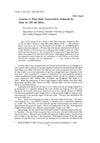 73 citations,
January 2013 in “Annals of Dermatology”
73 citations,
January 2013 in “Annals of Dermatology” People with hair loss, especially those with certain types, have lower zinc levels, and zinc supplements might help.
[object Object] 
Zinc levels and lymphocyte counts might be important in heart disease development.
 October 2023 in “Acta dermato-venereologica (Print)”
October 2023 in “Acta dermato-venereologica (Print)” People with severe hair loss have lower zinc levels in their blood.
 1 citations,
January 2023 in “International journal of urology”
1 citations,
January 2023 in “International journal of urology” Low zinc levels are linked to low testosterone but not to sexual problems.
26 citations,
October 2011 in “Biological trace element research” Low copper levels might cause premature graying of hair.
 February 2023 in “Benha Journal of Applied Sciences”
February 2023 in “Benha Journal of Applied Sciences” People with Telogen Effluvium have similar zinc levels in their blood as healthy individuals.
 February 2021 in “Austin journal of nutrition & metabolism”
February 2021 in “Austin journal of nutrition & metabolism” Appropriate zinc levels may help prevent hair loss in university students.
 14 citations,
August 2016 in “Journal of nanomedicine research”
14 citations,
August 2016 in “Journal of nanomedicine research” Zinc oxide nanoparticle biscuits improved growth and health in zinc-deficient rats without toxicity.
 3 citations,
November 2022 in “Frontiers in oncology”
3 citations,
November 2022 in “Frontiers in oncology” Low zinc levels may be linked to the return of gynecologic cancers.
 5 citations,
May 2020 in “Diagnostics”
5 citations,
May 2020 in “Diagnostics” Lower zinc levels may predict less effective hair loss treatment.
 3 citations,
February 2005 in “Journal of Quantitative Spectroscopy & Radiative Transfer/Journal of quantitative spectroscopy & radiative transfer”
3 citations,
February 2005 in “Journal of Quantitative Spectroscopy & Radiative Transfer/Journal of quantitative spectroscopy & radiative transfer” Iron and zinc levels in hair are not linked to hair loss from chemotherapy.
 March 2024 in “International journal of molecular sciences”
March 2024 in “International journal of molecular sciences” Zinc, copper, and iron are important for skin health and may help diagnose skin diseases.
[object Object] 1 citations,
December 2021 in “Animals” Low zinc and selenium levels in sheep are linked to hair loss and thyroid problems.
3 citations,
December 2019 in “Biomaterials Research/Biomaterials research” Calcium and magnesium in hair increase with age and are higher in adult women.
 114 citations,
October 2009 in “Gastroenterology”
114 citations,
October 2009 in “Gastroenterology” Zinc is crucial for nutrition, especially in patients with specific health conditions, and requires careful supplementation and monitoring.
 73 citations,
May 1976 in “JAMA”
73 citations,
May 1976 in “JAMA” Long-term parenteral nutrition without zinc can cause severe zinc deficiency.
 5 citations,
December 2014 in “Polish Journal of Public Health”
5 citations,
December 2014 in “Polish Journal of Public Health” Zinc is essential for many body functions and imbalances can lead to health problems.
 4 citations,
January 1992 in “The Tohoku Journal of Experimental Medicine”
4 citations,
January 1992 in “The Tohoku Journal of Experimental Medicine” Zinc made mice's coarse hair turn into fine hair without affecting skin structure.
 June 2022 in “International Journal of Health Sciences (IJHS) (En línea)”
June 2022 in “International Journal of Health Sciences (IJHS) (En línea)” Pregnant women with hair loss often have low zinc and iron levels.
 January 2021 in “Middle East journal of applied sciences”
January 2021 in “Middle East journal of applied sciences” Zinc is essential for plant growth and human health, but many soils lack enough zinc, affecting crops and potentially leading to health problems.
 75 citations,
May 2013 in “Journal of the American Academy of Dermatology”
75 citations,
May 2013 in “Journal of the American Academy of Dermatology” Zinc deficiency in children can cause skin issues and can be serious if not diagnosed and treated properly.
 37 citations,
March 2014 in “Journal of Trace Elements in Medicine and Biology”
37 citations,
March 2014 in “Journal of Trace Elements in Medicine and Biology” Lower hair zinc and copper levels found in Turkish males with hair loss; higher BMI linked to less hair zinc.
 35 citations,
January 2006 in “Journal of Dermatological Treatment”
35 citations,
January 2006 in “Journal of Dermatological Treatment” Zinc can help with some skin problems, but its effectiveness varies depending on the condition.
 33 citations,
April 2009 in “Clinical and Experimental Dermatology”
33 citations,
April 2009 in “Clinical and Experimental Dermatology” Psychological factors like depression may be more important than zinc, folate, and vitamin B12 levels in causing scalp pain in people with hair loss.
 27 citations,
May 2010 in “Dermatologic Clinics”
27 citations,
May 2010 in “Dermatologic Clinics” Zinc can be a helpful secondary treatment for certain skin conditions, but more research is needed to guide its use.
 21 citations,
April 2010 in “Molecular Medicine Reports”
21 citations,
April 2010 in “Molecular Medicine Reports” Zinc supplementation may help improve treatment outcomes for chronic hepatitis C.
 19 citations,
February 2018 in “Nutrients”
19 citations,
February 2018 in “Nutrients” Certain zinc transporters are essential for healthy skin and managing zinc in the body could help treat skin problems.
 10 citations,
January 2012 in “International Journal of Trichology”
10 citations,
January 2012 in “International Journal of Trichology” The study found no link between anxiety, vitamin B12, folate, TSH, ferritin, zinc levels, and trichodynia in telogen alopecia patients.
 9 citations,
April 2023 in “Journal for Research in Applied Sciences and Biotechnology”
9 citations,
April 2023 in “Journal for Research in Applied Sciences and Biotechnology” Zinc is important for growth and health in animals, plants, and humans, and not having enough can cause various problems.
 5 citations,
July 2017 in “Women & Health”
5 citations,
July 2017 in “Women & Health” Nursing women in the West Bank with higher income and non-smoking habits have higher blood zinc levels.



























